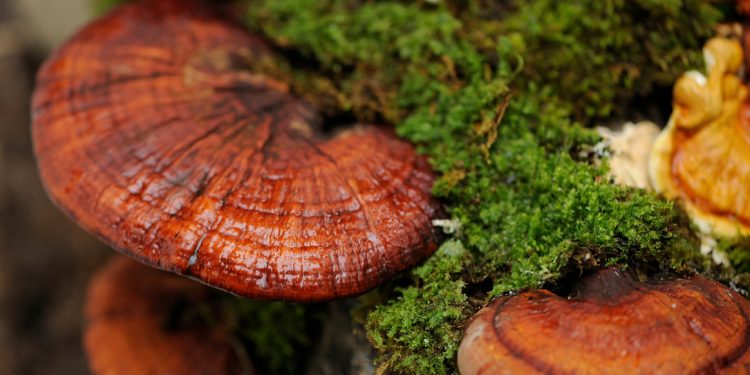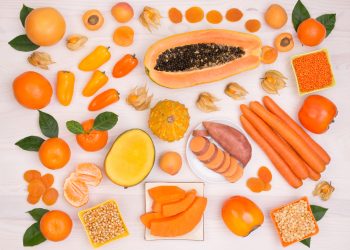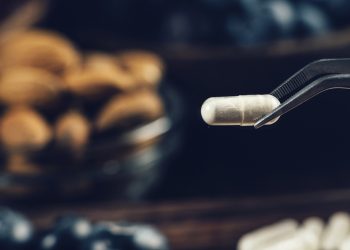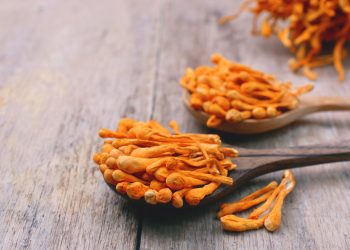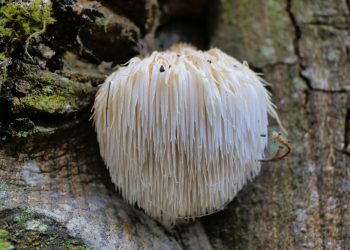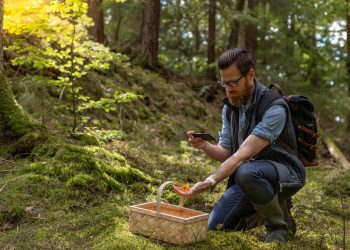In previous blogs, we’ve talked about the importance of beef organs for your nails, your skin, and your fertility. We’ve even gone over how to combine your organ meat intake with nootropic foods and supplements!
But in this article, we’ll be covering a different topic: mushrooms. More specifically, reishi mushrooms…and their physical and mental benefits. It turns out reishi mushrooms might complement your organ meat intake. Keep reading to learn more.
- What are Reishi Mushrooms?
- 5 Top Health Benefits of Reishi Mushrooms
- Stronger Immunity
- Improved Mood
- Better Heart Health
- Improved Antioxidant Status
- Reduced Cancer Risk
- Reishi Mushroom Q&A: Side Effects, Adaptogens, and More
- What to Look For in Premium Reishi Mushrooms
- Reishi and Organ Meats: Better Together?
What are Reishi mushrooms?
The reishi mushroom is one of the most popular medicinal mushrooms of all. They’re known as Ganoderma lucidum in Latin and Lingzhi in Chinese.
Reishi mushrooms grow throughout much of Asia, particularly in humid Southeastern Asia. Humans in these areas have been consuming reishi for thousands of years.
Early reishi enthusiasts believed its benefits transcended the physical. Consistent reishi use enabled one to see and interact with the spiritual realm — or become an immortal spirit. [1]
One early medical text, the Divine Farmer’s Classic of Pharmaceutics, claimed that reishi increased life force in the heart region:
“[Lingzhi] is bitter and balanced. It mainly treats binding in the chest, boosts the heart qi, supplements the center, sharpens the wits, and [improves the memory]. Protracted taking may make the body light, prevent senility, and prolong life so as to make one an immortal.”
Lingzhi was also heavily used by Li Ching Yuen, a Chinese herbalist and army advisor who may have led one of the most interesting lives ever recorded. Li was born in 1736, retired from military service at age 78, and continued gathering and mixing herbs into his 200s. Li finally passed away in 1933 at the age of 197. (Some contest that he was 256 at the time of his passing.) [2]
While gerontologists discount the idea that Li — or anyone else — has ever lived to 200, it’s clear that he and his followers lived very long lives. They stayed active til the end and passed away peacefully. Might the reishi mushroom be a central part of their approach?
Regardless, it’s clear that reishi is a staple in Chinese Traditional Medicine and other Eastern schools of thought. Its very name literally means “spiritual plant of longevity” when translated!
5 Top Health Benefits of Reishi Mushrooms
In recent decades modern science is beginning to quantify reishi’s once-elusive upsides. There is no proof it’ll make you live to 197 yet, but in the meantime, there are still plenty of benefits to experience. Below are 5 of our favorite ones.
- Stronger Immunity
- Improved Mood
- Better Heart Health
- Improved Antioxidant Status
- Reduced Cancer Risk
Benefit 1: Stronger Immunity
Reishi mushrooms have the ability to strengthen the immune system. They may help your white blood cells recognise invaders, all while keeping inflammation down to a minimum. [3]
Reishi may also activate natural killer (NK) cells and dendritic cells. It may reduce the dangers inherent to E. coli, pneumococci, and staphylococci infections. It may even assist cancer patients with white blood cell activity. [4]
Reishi may benefit the immunity of those who are already in perfect health. One study found improved lymphocyte function in athletes, leading to a reduced long-term risk of infection.
All in all, reishi may bolster innate immunity in both the healthy and the sick. No wonder Traditional Chinese Medicine practitioners prize its longevity-boosting abilities.
Benefit 2: Improved Mood
Reishi mushrooms are also capable of causing tangible upliftment. Some people find themselves coming out of a sort of mental fog once they begin taking reishi. The potential benefits include:
- Improved mood
- Improved cognitive function
- Improved creativity/dynamic thinking
- Reduced brain fog/forgetfulness
- Reduced anxiety and depression
- Reduced anger and irritability
And reishi’s mental benefits may go even deeper than this. The ancients believed reishi was capable of strengthening the heart’s life force. Could it be they alluded to something psychological — the mushroom’s ability to help you get in touch with your real self? This sort of inner unity is exactly what many modern reishi users experience.
Reishi’s mood-boosting properties apply almost regardless of one’s health status. Anecdotal reports imply that reishi has a calming effect on almost anyone. Studies show that reishi may improve mood in people with neurasthenia, breast cancer, and other ailments. [5][6]
Benefit 3: Better Heart Health
Perhaps the early Chinese herbalists were right about reishi’s ability to nourish the heart.
Modern scientific research shows that reishi supplements may result in more ‘good’ cholesterol and fewer triglycerides. While we need more research to really exemplify reishi’s effects on the heart, these initial findings are promising. [7]
Benefit 4: Improved Antioxidant Status
Antioxidants take all sorts of shapes and sizes. They’re found in fruits, vegetables, and herbs (and certain fungi, of course). Antioxidants are molecules that prevent free radicals and cell damage. Think of them like cellular lubricants of sorts.
Modern analysis shows that reishi contains several classes of antioxidants, including: [8]
- Polysaccharides
- Peptidoglycans
- Triterpenes
Several other types of compounds within reishi may also contribute to its anti-inflammatory load, including:
- Sterols
- Steroids
- Alkaloids
- Fatty acids
- Nucleosides
- Polypeptides
- Inorganic elements
Reishi’s antioxidant capabilities also mean good things for all you skincare enthusiasts. As one study put it, “[reishi’s anti-aging] effect of lifespan extension is only the tip of the iceberg.” The same mechanism of action that makes reishi great for healthspan makes it great for your skin, too. Reishi may: [9]
- Reduce or reverse UV-induced skin damage
- Strengthen the skin’s extra-cellular matrix
- Increase skin collagen formation
- Reduce ROS levels in the skin
Benefit 5: Reduced Cancer Risk
One study of roughly 4,000 breast cancer survivors found that ~60% of them consumed reishi on a regular basis. Test-tube research has found the same thing. Linking reishi’s active ingredients to apoptosis, or death, of cancer cells. So far studies have looked at this shroom’s ability to ward off breast, prostate, and/or colon cancer. [10]
More research is still needed in these areas. It’s unclear exactly how much reishi reverses cancer growth, and it’s also unclear if reishi will work for other more aggressive types of cancer. Most experts believe that reishi should be used alongside pharmaceutical cancer treatments, not used as a replacement for them.
Many of reishi’s biggest proponents use this mushroom for one reason: reduced risk of cancer.
Reishi Mushroom Q&A: Side Effects, Adaptogens, and More
Did reishi mushrooms originate in Asia?
Yes. Southeast Asia is the reishi mushroom’s native habitat — and the location where people first started using them.
Why is reishi called the “mushroom of immortality?”
Ancient Taoists believed reishi was a sort of elixir of life capable of renewing vitality from the inside out.
Are reishi mushrooms considered adaptogens?
Yes, reishi mushrooms possess several adaptogenic qualities.
Do reishi mushrooms contain beta-glucans?
Yes. Beta-glucans are just one of the many classes of compounds contained in reishi mushrooms.
Do reishi mushrooms affect blood pressure?
Not usually.
Does reishi lower blood pressure or blood glucose levels?
Not generally.
Can reishi assist with low blood pressure?
More research is needed in this area.
Do reishi mushrooms have side effects?
Not usually. If side effects persist, take a break from consumption.
Can I take reishi while breastfeeding?
Anecdotally speaking, reishi is safe for nursing mothers. Be sure to talk to your doctor before you make a decision, though.
How do reishi mushrooms/mushroom spores grow?
Reishi mushroom spores are known to thrive around the base of living or dead deciduous trees.
Will reishi mushrooms improve my quality of life?
They sure have for many people — but there’s only one way to find out!
Do reishi mushrooms have a bitter taste?
Sometimes, but you don’t taste them if they’re taken in capsule form.
Do reishi mushrooms have anti-cancer or anti-tumour properties?
Yes, studies show that reishi may have anti-cancer properties.
Do reishi mushrooms improve immune function or trigger an immune response?
Yes, reishi may strengthen your innate immune system and prime it to fight diseases.
Are reishi mushrooms hepatoprotective?
Yes, reishi may have liver-protecting properties. Reishi is thought to be safe for those with hepatitis.
Is the powdered form of reishi most effective?
It’s certainly the most convenient and easiest to dose.
Is reishi considered a dietary supplement?
Yes, reishi is one of the most time-tested dietary supplements of all.
What to Look For in Premium Reishi Mushrooms
Just like beef organ supplements or anything else, not all reishi supplements are created equal. Make sure the reishi you’re looking at is high-quality before you buy. How? By assessing it according to the following metrics:
- Quality control
- Extraction method
- Purity from pollutants
Quality control
Brands can — and do — make various claims about what their products are capable of doing. The real proof of efficacy, however, lies in a brand’s lab tests. Be sure to look for a reishi product that’s been tested by third-party labs. Also called certificates of analysis, these tests ensure that the product in question contains all the good stuff it’s supposed to (and none of the bad stuff it’s not).
Another important aspect of quality control is sourcing. Most of us aren’t blessed with the ability to harvest fresh Lingzhi from the slopes of China’s Nanling mountains. The good news, however, is that we can settle for the next-best thing: 100% organic reishi powder grown and produced by some of Europe’s best cultivators.
Extraction method
Most reishi studies use an ethanol-processed reishi extract to make their findings. That’s because ethanol captures reishi’s ‘essence’ better than almost anything else. It has the rare ability to capture both fat- and water-soluble compounds, leading to a true-to-nature final product.
Purity from pollutants
Not all reishi is grown equally, either. Opt for a reishi product that was grown organically if you can. At the very least be sure to select an all-natural product that’s free from synthetic inputs. Growing reishi the right way is yet another aspect of sustainable agriculture. High-quality reishi farms will not use pesticides, herbicides, insecticides, or metabolic disrupters.
Reishi and Organ Meats: Better Together?
As great as reishi mushrooms are, they’re not quite a cure-all. It might work even better when it’s paired with organ meat supplements. As it happens, reishi and organ meats have quite a few things in common! Both classes of substances have natural nootropic qualities.
Reishi’s brain-boosting qualities come from its unique combination of:
- Triterpenoids
- Peptidoglycans
- Polysaccharides
Quality organ meats can be a powerful brain-boosting food. All the compounds they contain can complement existing supplements you may be taking if you already have other nootropics.
Organ meats, on the other hand, confer their nootropic qualities via an entirely different set of metabolic compounds, including:
- Peptides
- Hormones
- Bioactive lipids
Some researchers believe that organ meats’ brain-boosting nature is evolutionarily conserved:
“Advances in molecular biology have revealed the ability of food-derived signals to mediate the effects of food on cognitive function, which is likely to have been crucial for the evolution of the modern brain.” [11]
In other words, our distant ancestors grew up eating organ meats. Given that organ meats are nature’s very best source of phosphatidylserine, maybe they were onto something.
Reishi Mushroom Benefits: Summing Things Up
You’d be hard-pressed to find a supplement that’s as safe, effective, and time-tested as the reishi mushroom. This sacred shroom has been used within traditional medicine systems for thousands of years. Why not join your ancestors and add reishi extract — and maybe organ meats, too — back into your daily routine?

